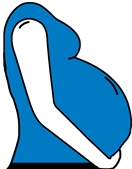Induction of labour is when labour is started artificially. If it is felt that you or your baby’s health is likely to benefit, your midwife or doctor may offer and advise an induction of labour.
On average in the UK, 3 in every 10 pregnancies are inductions. When induction of labour is advised by your doctor or midwife, they will discuss your options with you before you make a decision. This will include explaining what will happen, why it is being advised and any risks to you or your baby.
Why Might I Be Offered An Induction Of Labour?
You may be offered an induction of labour for many different reasons, here are some of the most common reasons for induction of labour;
most common reasons for induction of labour;
It is unlikely you will be offered an induction prior to 37 weeks of pregnancy unless there are concerns about yours or your baby’s wellbeing.
39 Week Membrane Sweep
A sweep is performed to help promote labour. A membrane sweep is where the midwife places a gloved finger just inside your cervix (neck of the womb) and makes a sweeping circular motion to separate the membranes (sac around the baby) from the cervix. It is your choice whether to have this procedure.
There is evidence that this can start natural labour hormones. Labour may start naturally within a couple of days of the sweep, but if not, your midwife may discuss repeating it.
You may also experience some contractions or spotting (a very small amount of blood loss) in the 24 hours after the sweep. If you have any concerns, please call your local maternity unit. Membrane sweeps are not associated with increased rates of infection or an increased likelihood of your waters breaking before labour begins. They do not cause any harm to your baby.
How Will Labour Be Induced?
There are different methods of induction. The type recommended to you will depend on your health, pregnancy, if you have had a baby before and your baby’s wellbeing. Your midwife or doctor will discuss with your which method is recommended for you.
If you decide against induction, you can choose to wait for spontaneous labour or opt for a caesarean section. The decision will be completely your choice.
Risk & Benefits Of Induction Of Labour
It is your decision if you want to be induced. You may want to consider the risks and benefits before you make a decision;
Benefits
Risks
Pain Relief Options
In the early stage of induction you can use a TENs machines, birthing balls, baths, paracetamol, pethidine or oramorph (oral morphine drink).
Once you are in active labour or are transferred to delivery suite to continue your induction, you can access all the above as well as gas and air or an epidural.
Induction of Labour Booklet
To read in more detail about induction of labour, you can download our Norfolk & Waveney patient information booklet.
Busting The Myths!
There are lots of myths about how you can make your baby arrive quicker at the end of pregnancy, but most of them are nonsense! There is no available evidence that supports the following methods to induce labour:
Raspberry leaf tea, Herbal supplements, Acupuncture, Castor oil hot baths, Enemas, Homeopathic methods to induce labour.
If you feel worried and would like more advice you can speak to your midwife throughout your pregnancy and up to 28 days after the birth of your baby.
If you live in Norfolk
If you live in Suffolk
Also in this section...